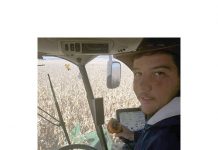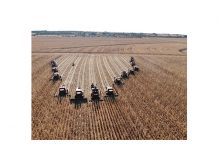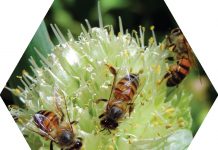The eighth annual business development programme, previously known as the Grain Academy, was launched in Hartbeespoort on 25 and 26 February. The programme has now been rebranded as the Leadership Academy for Agriculture and is presented in partnership with Grain SA and the North-West University Business School.
The Leadership Academy for Agriculture provides young producers with innovative and practical exposure. This will enable them to be leaders in agriculture at both farm and national level – giving them a chance to make a profound difference in their enterprises, communities as well as organised agriculture in South Africa.
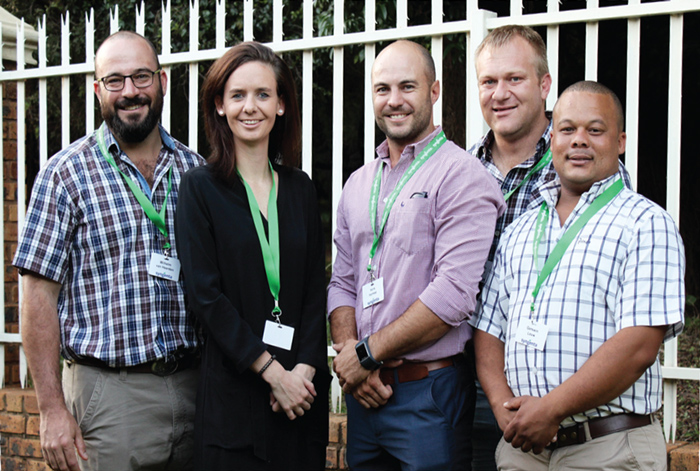
‘This year, the programme has been expanded into six different types of courses to accommodate more than one entry-level, in contrast to previous years. The entry levels are smallholders, micro farmers, newly commercialised farmers, existing commercial farmers and mega farmers. The level at which course participants enter as well as the subsequent course that they will complete, will be determined by the afore-mentioned criteria,’ said the developer and facilitator of the programme, Dr René Uys from Thinking Fusion Africa.
‘Becoming a leader can be compared with a smooth pebble. Initially, it was a broken piece of stone with rough and sharp edges that had to undergo tribulations in following the bumpy road of the streams and river that eventually spewed it up on the beach. Even though it was transformed into a smooth pebble, the waves still kept rolling it about. Developing as a leader is a life-long journey.
‘This programme has a pure leadership focus that includes self-leadership, leading others, relationship management and communication skills. Young South African farmers must have the emotional strength to face the harsh realities of agriculture in this country. In short, they have to be skilled and brave, which is why self-development is crucial. In this regard, the leadership course is invaluable.’
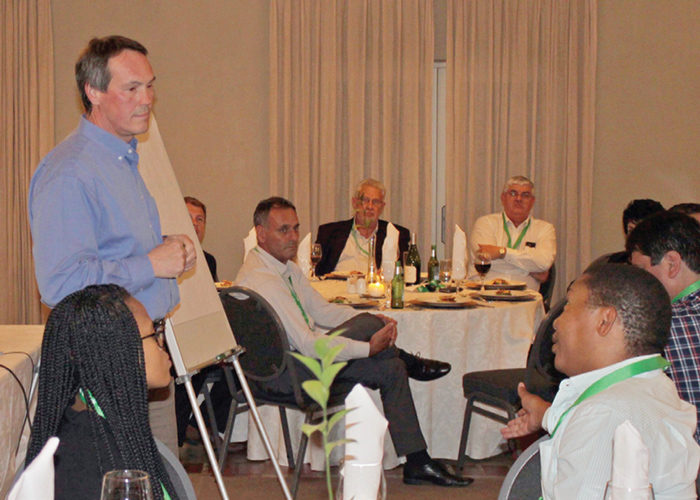
In his welcoming address to course attendees at the launch, Steve Hawkins, regional director EAME (Europe, Africa and Middle East) at Syngenta said, ‘Leadership is a journey and not a destination, as every day of your life towards this goal forms a part of your roller-coaster learnership curve which demands of you to be humble, to listen and observe and to nurture an inquisitive mind-set.
‘As a young leader in agriculture, you are faced with numerous current and future challenges such as global warming, a politicised agricultural environment, profitability, embracing the digital world of agriculture and preserving agriculture for the next generation. Syngenta believes that the future of agriculture should be shaped rather than just left to chance. As young leaders, you will define the future of agriculture in South Africa and it is therefore imperative for Syngenta to nurture leadership in the agricultural society.
‘To this end, we want to play our part in empowering young commercial producers to become leaders and to contribute as such in the future of our industry. The Leadership Academy for Agriculture is Syngenta’s Smart Farm philosophy in action by equipping candidates to be better people, better producers and better members of society.’
In his welcoming address Jannie de Villiers, CEO of Grain SA, stated that the country could heal itself through agriculture. ‘We are counting on you as young farmers and agri-professionals to bring about far-reaching and positive change. Through the Leadership Academy for Agriculture, we are establishing a contact network through the whole agricultural value chain among our young leaders, that will serve them well in bringing about change and reconciliation. If you are in a position to adhere to the call as a leader, you should take the challenge head-on.
‘I urge you to read as much as you can, observe great leaders and find yourself a mentor that has produced the fruit of successful leadership. The future of sustainable production lies in our competitiveness and it can only be improved with ongoing training. A leader must therefore never stop studying.’
In his remarks, Prof Jan van Romburgh, director of the North-West University Business School, emphasised the important role of education in the agricultural industry. ‘Young farmers who are also pursuing further education in becoming leaders, such as the various programmes offered by the Leadership Academy for Agriculture, will be able to contribute to the progress of agriculture and therefore sustainable food security.’
According to Prof Van Romburgh, the Leadership Academy for Agriculture creates an environment where leadership abilities are put to the test as the attendees, who are from different cultures and backgrounds, need to confront sensitive issues in which they have divergent opinions. This leads to a crucial and important understanding of each other and how to take advantage of each other’s strengths.



